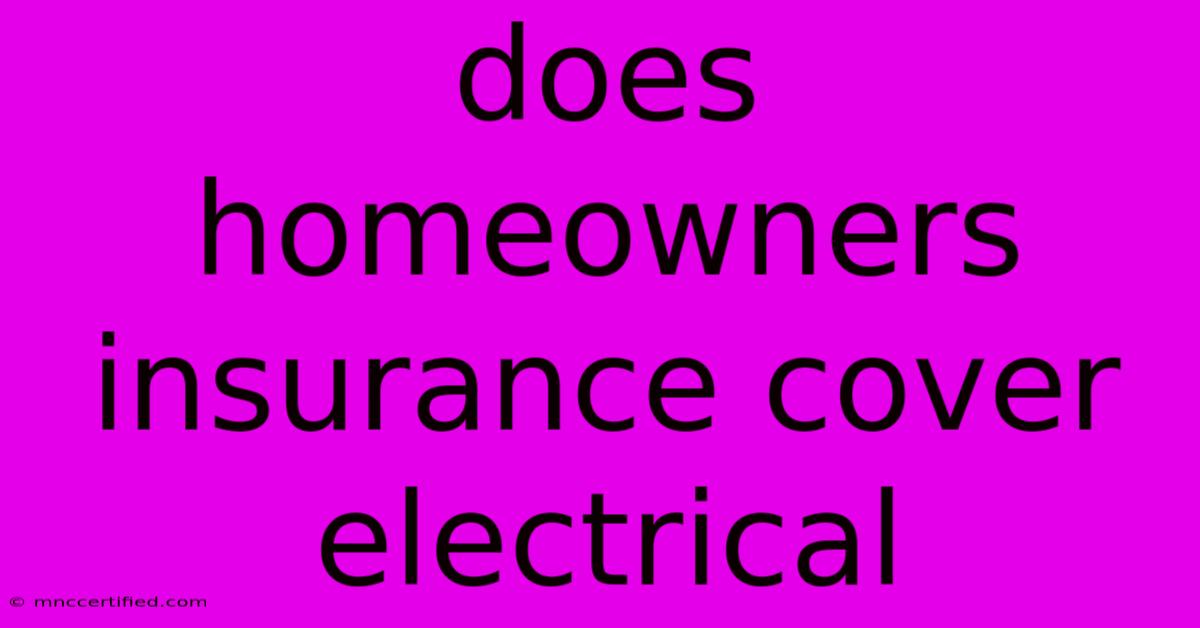Does Homeowners Insurance Cover Electrical

Table of Contents
Does Homeowners Insurance Cover Electrical Problems? A Comprehensive Guide
Electrical issues can be a homeowner's nightmare, leading to costly repairs and potential safety hazards. While your homeowners insurance policy offers protection against various risks, it's crucial to understand how it handles electrical problems. This article will delve into the intricacies of electrical coverage under homeowners insurance, helping you navigate this complex topic.
What Does Homeowners Insurance Typically Cover?
Homeowners insurance policies are designed to protect your property and belongings from a range of perils, including:
- Fire: Damage caused by fire is a standard coverage most policies offer.
- Windstorm and Hail: Protection against damage from strong winds, hailstorms, and other severe weather conditions.
- Lightning: Coverage for damage caused by lightning strikes, including electrical surges.
- Theft: Protection against losses due to burglary or theft of your belongings.
While these are common coverages, it's vital to check your specific policy details as coverage can vary.
Electrical Coverage: What's Included?
Electrical issues are covered by homeowners insurance under specific circumstances. Here's a breakdown:
Covered Events:
- Lightning Strikes: Damage caused by lightning strikes to your electrical wiring, appliances, and electronics is typically covered. This includes surges that can damage your devices even if the lightning didn't strike your house directly.
- Fires: If an electrical malfunction causes a fire, the damage to your property and belongings is covered.
- Sudden and Accidental Events: Your policy may cover damage from sudden and accidental events like a malfunctioning circuit breaker or a short circuit.
Not Covered Events:
- Normal Wear and Tear: Homeowners insurance doesn't cover the gradual deterioration of electrical systems due to normal wear and tear.
- Lack of Maintenance: If an electrical problem arises from neglecting routine maintenance, such as failing to have your wiring inspected regularly, your claim might be denied.
- Pre-existing Conditions: If an electrical issue was present before your policy's inception, it likely won't be covered.
Understanding Exclusions and Deductibles
Your homeowners insurance policy will have certain exclusions that specify what's not covered. For instance, it might exclude damage caused by:
- Improper Installation: Electrical work done by an unqualified electrician might not be covered.
- Negligence: If you knowingly ignored a potential electrical hazard and it led to damage, your claim might be denied.
- Flood Damage: Electrical damage caused by flooding is usually excluded from standard homeowners insurance policies. You might need to purchase additional flood insurance.
It's essential to understand the deductible, which is the amount you'll pay out-of-pocket before your insurance covers the rest.
How to Protect Yourself
Here are some steps to minimize electrical risks and ensure your policy adequately protects you:
- Regular Inspections: Get your electrical system inspected by a licensed electrician every few years to identify potential hazards.
- Proper Maintenance: Follow manufacturer instructions for maintaining your electrical appliances and wiring.
- Upgrade Your Electrical Panel: Consider upgrading your electrical panel to prevent overloading and potential fire hazards.
- Surge Protection: Install surge protectors for your appliances and electronics to mitigate damage from electrical surges.
- Read Your Policy: Thoroughly review your homeowners insurance policy to understand your coverage limits, exclusions, and deductibles.
Contact Your Insurance Agent
If you have concerns about your electrical coverage or need clarification about specific scenarios, don't hesitate to contact your insurance agent. They can explain your policy details and provide personalized advice to protect your home and family.
By understanding the nuances of electrical coverage under your homeowners insurance, you can make informed decisions, mitigate risks, and ensure you have adequate protection against unexpected electrical problems.

Thank you for visiting our website wich cover about Does Homeowners Insurance Cover Electrical. We hope the information provided has been useful to you. Feel free to contact us if you have any questions or need further assistance. See you next time and dont miss to bookmark.
Featured Posts
-
San Francisco Mayoral Race Lurie Holds Early Lead
Nov 07, 2024
-
Project 2025 Understanding The Right
Nov 07, 2024
-
How To Make A Neutral Ground Bonding Plug
Nov 07, 2024
-
Republican Election Denial A Persistent Issue
Nov 07, 2024
-
Green Community West Dubai Investment Park
Nov 07, 2024